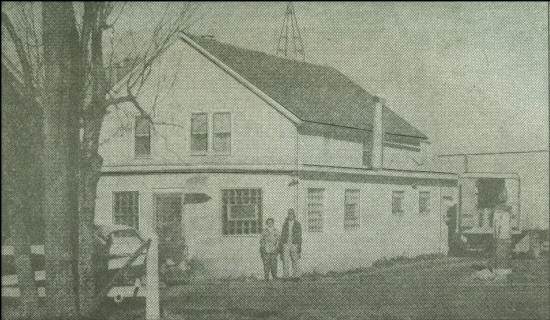|
|
|
Clark County Press, Neillsville, WI June 8, 1994, Page 28 Transcribed by Dolores (Mohr) Kenyon. Index of "Good Old Days" Articles
|
|
|
|
Clark County Press, Neillsville, WI June 8, 1994, Page 28 Transcribed by Dolores (Mohr) Kenyon. Index of "Good Old Days" Articles
|
Good Old Days
A SUMMARY OF CLARK COUNTY DEVELOPMENT INTO THE DAIRY INDUSTRY
By Dee Zimmerman
Nearly a century and a half ago, farming in Clark County was growing what could be used at home. The pioneers went great distances, by walking or driving oxen to obtain staple food items. They made trips to Black River Falls, Sparta or La Crosse for the bare necessities. After setting up claims on their acreage, they cleared off some trees, growing vegetables between the stumps, as well as a little hay and grain for the oxen and poultry.
At the close of the 19th century, farming was called “general farming” with hay and grain as cash crops which supplied the family needs. A common sight in harvest days was the old-style threshing steam engine and separator moving from one farm to another to thresh out the small grain. Before the 19th century’s end dairying had started.
By 1905, the idea of dairying had taken hold, for the county recorded having 28 creameries and 30 cheese factories. There were 24,456 cows, with an average value of $22.90. The county’s total value of dairy products was reported as $777,381, and the total value of other farm products was $980,346. The total gross farm income 45 years later was $17,558,788 with the milk portion of that being $12,588,782 and the remainder for all other farm products. The value of milk was more than twice the value of all other farm products. Cattle numbered 92,577 at that time.
Also in the year 1950, Clark County was ranked the first county of Wisconsin in the volume of production of American cheese, producing annually upwards of 30 million pounds.
It was third in total cheese, second in hay and fourth in whole milk.
Prior to the turn of the century, the farmer’s wife made butter the old home-style way, trading it in at the general store for other food items. Some of the hardworking farmers were pioneering the dairy industry, building small plants for processing dairy products, in the late 1890’s.
Shortly after the turn of the century came the era of the cream separator with cream going to the central plant and skimmed milk kept on the farm for calves and the pigs.
John Wuethrich assumed the manager-ship of a farmer’s cooperative creamery, near Greenwood in 1904. He gradually developed the operation from a small scale, at first, into a major operation which exists yet today.
The pioneering ways were on their way out when John Wuethrich, of Swiss origin, took over a farmer-owned cooperative creamer, near Greenwood. Starting in a simple way, Wuethrich worked on a small scale, and gradually developed it into a major operation known today as Grassland Dairy Products, Inc. In the beginning, 1904, the factory was typical of the factories developed over the county at that time. The Wuethrich factory was a relatively small frame building, with minimum simple equipment considered necessary in those days.
The Wuethrich plant of the earlier years: The picture was taken at the time of the transition from the 30 gallon can to the 10 gallon can. The projected roof and intake section of the building, housed the pulley, rope or chair which was worked by a winch. That device lifted the heavy 30 gallon can of cream from the wagon and pushed it around to the weighing tank.
As well as a plant operator, Wuethrich was a farmer and breeder of Holstein cattle. He would buy animals of high breeding in order to build up his Distinction strain of cattle. The average value of a cow in early 1900’s was $22.50. Imig’s of the Town of Weston climaxed the values when they sold their gold medal sire, Wisconsin Leader, in 1952.
Thorp was the center (of) the Blue Moon Foods, Inc. in the early 1950’s. At that time, the concern had three large plants and warehouses producing a diversity of dairy products ranging from natural American cheese to fancy packaged cheese, including its own Bleu cheese and an exclusive semi-soft variety, produced under an ancient formula and known as “Gold’N Rich.” The Blue Moon products were sold throughout the United States.
There were many cheese factories in the county during the 40s and 50s.
(To be continued)
¤¤¤¤¤¤¤¤¤¤¤¤¤¤¤¤¤¤¤
The Hal B. Andrus family in their surrey with the fringe on top as they went for an outing. With him were his wife, Ethel Caldwell Andrus, daughters Dorothy Andrus Vanderhoeve and Vera Andrus. Mr. Andrus had one of the first butter factories in Clark County at the turn of the century.
Showing dairy cattle at the Clark County fairgrounds during the early 20s drew a large group of spectators to watch the event. Even the team of oxen seemed to be caught up in the review.
 |
Oakland Cheese Factory of Curtiss, as it appeared in 1958. It made 2 and 5 pound loaves of cheddar, Colby, Kummin-ost varieties which were sold by distributors in central area of the state. Operators of the cheese factory at that time were Gordon and Erma Munson.
|
© Every submission is protected by the Digital Millennium Copyright Act of 1998.
Show your appreciation of this freely provided information by not copying it to any other site without our permission.
Become a Clark County History Buff
|
|
A site created and
maintained by the Clark County History Buffs
Webmasters: Leon Konieczny, Tanya Paschke, Janet & Stan Schwarze, James W. Sternitzky,
|